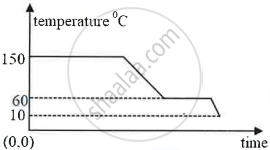Advertisements
Advertisements
Question
Match the columns.
| Column A | Column B |
| 1) Absolute humidity | a) J or cal |
| 2) Latent heat | b) J/kg °C |
| 3) Specific heat capacity | c) kJ/kg |
| 4) Heat | d) no unit |
| e) kg/m3 |
Solution
| Column A | Column B |
| 1) Absolute humidity | e) kg/m3 |
| 2) Latent heat | c) kJ/kg |
| 3) Specific heat capacity | b) J/kg °C |
| 4) Heat | a) J or cal |
APPEARS IN
RELATED QUESTIONS
State two characteristics of a good thermion emitter.
State any two measures to minimize the impact of global warming.
What is the Greenhouse effect?
Write the approximate value of specific latent heat of ice.
Which has more heat: 1 g ice at 0℃ or 1g water 0℃? Give reason.
A thermally insulated pot has 150 g ice at temperature 0°C. How much steam of 100°C has to be mixed to it, so that water of temperature 50°C will be obtained? (Given : latent heat of melting of ice = 80 cal/g, latent heat of vaporization of water = 540 cal/g, specific heat of water = 1 cal/g °C)
Define the term ‘specific latent heat of fusion’ of a substance.
Explain the meaning of greenhouse effect.
State two advantages of the high specific latent heat capacity of steam, which is about 226 × 104 J/kg?
If there is no Heat loss to the surroundings, the heat released by the condensation of m1 g of steam at 100°C into water at 100°C can be used to convert m2 g of ice at 0°C into water at 0°C.
(i) Find:
(a) The heat lost by steam in terms of m1
(b) The heat gained by ice in terms of m2
(ii) Form a heat equation find the ratio of m2 : m1
Specific latent heat of vaporization of steam = 2268 kJ/kg
Specific latent heat of fusion of ice = 336 kJ/kg
Specific heat capacity of water = 4200 J/kg°C
If pressure increases, the melting point of a substance ______.
When ice is converted into water : constant temperature : : before the water evaporates : _______
Find the odd one out and give its explanation.
Write scientific reason.
Use a pressure cooker to cook food in cold air.
Observe the following graph and answer the following questions:

- What does the graph represent?
- What does the line AB represent?
- What does the line BC represent?
The diagram below shows a cooling curve for a substance:

- State the temperatures at which the substance condenses.
- The temperature range in which the substance is in liquid state.
- Why do we prefer ice to ice-cold water for cooling a drink?
20 g of ice at 0°C absorbs 10,920 J of heat energy to melt and change to water at 50°C. Calculate the specific latent heat of fusion of ice. Specific heat capacity of water is 4200 J kg-1 K-1.
